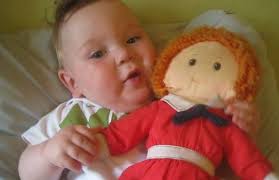What To Do About Gender Identity Issues in Young Kids - For most parents, their child's identification with their gender is not a matter of concern.
Even though we've seen a gradual loosening of stereotypical gender behaviors over the past few decades, most little boys still play with trucks and little girls with dolls. For a very small number of children, however, their gender identity is not as clear-cut; they identify more with the opposite sex than with their own. In the simplest terms, they are little boys who want to be like girls, and little girls who want to be like boys.

Years ago, this behavior would have signaled a serious psychological problem best dealt with by intensive psychotherapy and behavior modification. Today, particularly in more liberal urban areas of the United States, transgender advocates argue that we should let these children "be who they want to be."
The alternative, they say, is to doom them to a life of depression, suicidal ideation, and self-loathing as has been reported in studies of transgendered people. A few states have passed laws protecting the rights of transgendered persons, and New York City is currently considering legislation that will allow them to change the sex on their birth certificates.
Not everyone agrees with this view of gender-variant behavior. Quoted in a recent article in The New York Times, Dr. Kenneth Zucker, Director of the Gender Identity Service of the Center for Addiction and Mental Health in Toronto, opposes the so-called "free to be" approach in which children are allowed to dress and adopt other behaviors more appropriate to the opposite sex, supported by their parents and others in their social circle.
Zucker has treated hundreds of gender-variant preadolescent children. In his experience, about 80 percent of these children "grow out" of their gender-conflicted behavior and do well. His approach is to help them develop a greater acceptance of their natural biology until they grow older and have developed a more stable platform on which to establish their identity.
Many professionals argue and I agree that encouraging a "free to be" approach reinforces gender confusion and encourages behavior that runs completely counter to the mainstream, making these children the object of mockery, derision, and isolation by their peers.
In my opinion, the most important issue in this debate has to do with the fact that children's self-concepts and role behaviors are not really set and can vary until they reach late adolescence. Allowing children to adopt the behaviors of the opposite sex and reinforcing that choice early on may help to minimize their distress over the short term.
Even though we've seen a gradual loosening of stereotypical gender behaviors over the past few decades, most little boys still play with trucks and little girls with dolls. For a very small number of children, however, their gender identity is not as clear-cut; they identify more with the opposite sex than with their own. In the simplest terms, they are little boys who want to be like girls, and little girls who want to be like boys.
Years ago, this behavior would have signaled a serious psychological problem best dealt with by intensive psychotherapy and behavior modification. Today, particularly in more liberal urban areas of the United States, transgender advocates argue that we should let these children "be who they want to be."
The alternative, they say, is to doom them to a life of depression, suicidal ideation, and self-loathing as has been reported in studies of transgendered people. A few states have passed laws protecting the rights of transgendered persons, and New York City is currently considering legislation that will allow them to change the sex on their birth certificates.
Not everyone agrees with this view of gender-variant behavior. Quoted in a recent article in The New York Times, Dr. Kenneth Zucker, Director of the Gender Identity Service of the Center for Addiction and Mental Health in Toronto, opposes the so-called "free to be" approach in which children are allowed to dress and adopt other behaviors more appropriate to the opposite sex, supported by their parents and others in their social circle.
Zucker has treated hundreds of gender-variant preadolescent children. In his experience, about 80 percent of these children "grow out" of their gender-conflicted behavior and do well. His approach is to help them develop a greater acceptance of their natural biology until they grow older and have developed a more stable platform on which to establish their identity.
Many professionals argue and I agree that encouraging a "free to be" approach reinforces gender confusion and encourages behavior that runs completely counter to the mainstream, making these children the object of mockery, derision, and isolation by their peers.
In my opinion, the most important issue in this debate has to do with the fact that children's self-concepts and role behaviors are not really set and can vary until they reach late adolescence. Allowing children to adopt the behaviors of the opposite sex and reinforcing that choice early on may help to minimize their distress over the short term.
But it could also prevent them from dealing with a core conflict that may continue to haunt them for the rest of their lives. By affirming a "diagnosis" of gender dysphoria (the term used by medical professionals to describe this behavior) early on, we may be subtly encouraging the gender-confused child to blame all of his or her unhappiness and disappointments on the transgender issue instead of tackling and working through what may be relatively normal conflicts of growing up. ( lifestyle.yahoo.com )
No comments:
Post a Comment